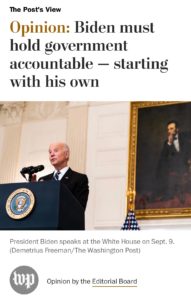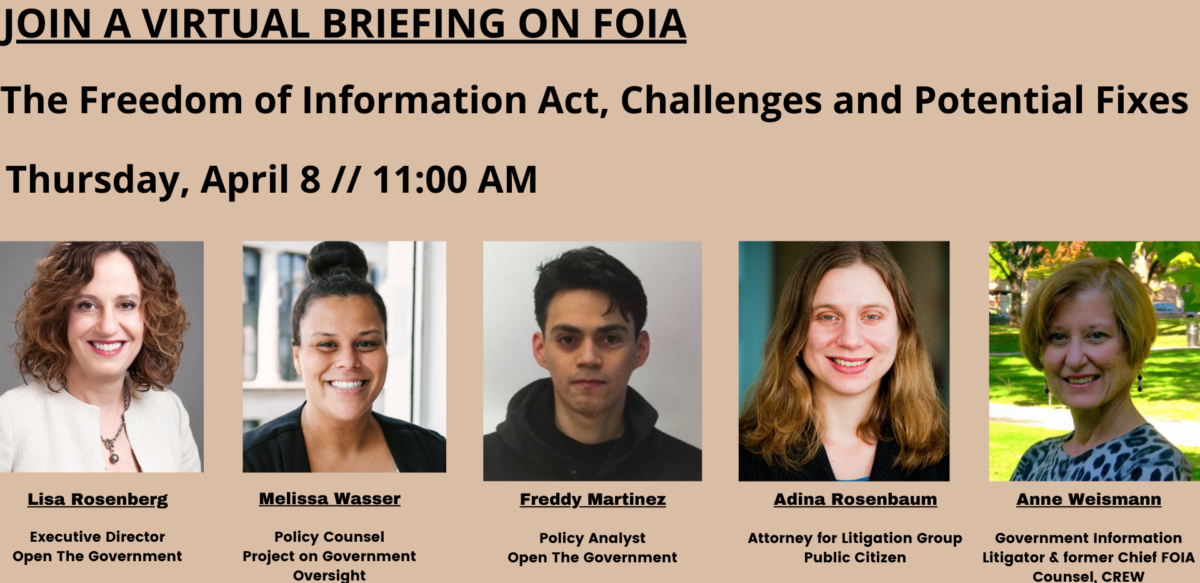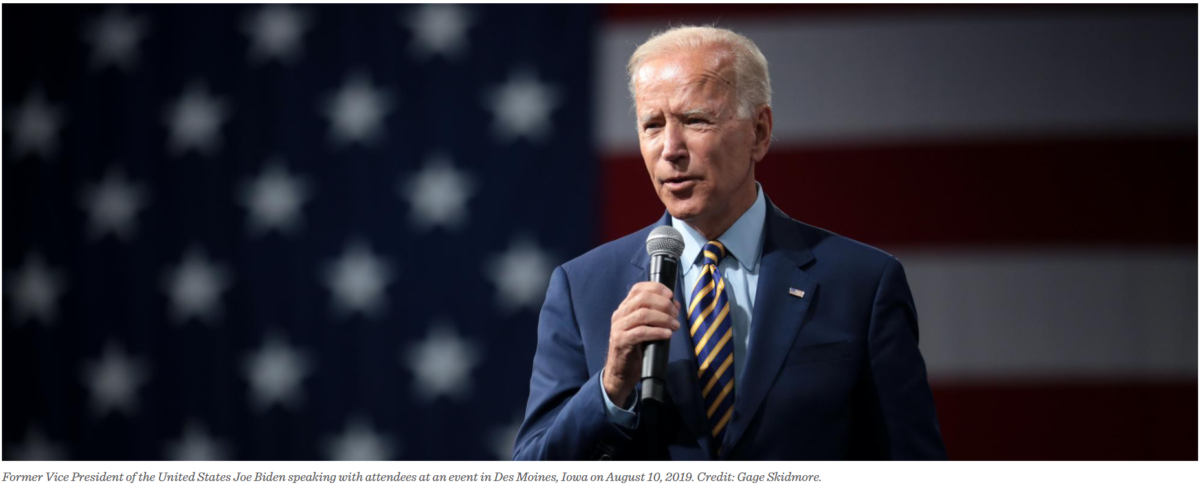On April 15, 2021, government ethics and accountability experts from American Oversight, Open The Government, the Campaign Legal Center, and Citizens for Ethics and Responsibility in Washington (CREW) participated in a liveblog event. The panelists discussed the reality of government corruption, how it works in practice, and steps that federal officials can take to prevent it. The following is a transcript of the event that has been lightly edited for clarity.
Ufuoma Otu (Open The Government): Hi everyone, welcome to our liveblog on “Rooting Out Corruption in Government: What Will It Take?” I’m Ufuoma Otu, communications director at Open The Government, a nonpartisan coalition focused on advancing policies that create transparency and accountability in government.
I am joined by:
- Jennifer Ahearn, Policy Director, and Justine Ellis, Fellow, Citizens for Responsibility and Ethics in Washington (CREW);
- Delaney Marsco, Ethics Counsel, Campaign Legal Center; and
- Austin Evers, Executive Director, American Oversight.
Austin Evers (American Oversight): Hello everyone — looking forward to digging into corruption and how to bring integrity to government.
Ufuoma Otu: This discussion is part of a series of ongoing events to promote Accountability 2021, a roadmap of federal reforms developed by accountability experts from across the political spectrum. You can learn more about the initiative at accountability2021.org. Feel free to ask questions of the panelists. And thank you to everyone who pre-submitted questions via Twitter!
Jennifer Ahearn (CREW): Hello all! Looking forward to a great discussion!
Delaney Marsco (Campaign Legal Center): Hi all! Excited to be here with Jennifer, Justine, Austin, and Ufuoma.
Justine Ellis (CREW): Hello, everyone—Looking forward to the discussion ahead!
Ufuoma Otu: Question: Surveys say public trust in government is at historic lows. What’s your sense of the reason for that? And what kinds of reforms can policymakers enact to counter corruption and, in turn, give the public more confidence in our government?
*
Jennifer Ahearn: I think lack of transparency is a big contributing factor here. Uncertainty about who has power over decision-making can leave us in the dark about the incentives or motives that factor into policy, and that can really erode public trust. Without transparent practices in our government, we can’t identify or address the forces exerting influence on our political processes.
Austin Evers: The loss of trust in government is a serious and complex issue. According to one measure, Americans’ trust that government will do the right thing has dropped from 73 percent in 1958 to 17 percent today.
I think one of the core reasons is that people doubt — and have reasons to doubt — that government officials are acting with integrity. People assume special interests and personal interests dictate policy outcomes.
Delaney Marsco: I think it’s impossible to pinpoint one reason for the decline in the public’s trust in government. But a combination of things certainly play a role. The revolving door between special interests and government; the influx of money in politics; the rise in lobbyist-run agencies; and the shattering of long-standing ethics norms all raise red flags for the public. It’s hard to see this sort of corruption happening and not think, “The government isn’t working for me, and the system is rigged for the wealthy and well-connected.”
Justine Ellis: To Jen’s point, we can’t always discern government officials’ motives or intentions (good, bad, or neutral) with a high degree of certainty, but we can trace possible influences on our government officials that could sway their decision-making towards financial self-interest and away from the public good.
Austin Evers: In terms of policy changes, we can make influence more transparent and less effective; we can ensure people who enter government are not improperly influenced; and we can make sure people leaving government can’t cash in their public service by lobbying their old colleagues. Rules like that would protect integrity in government decision-making. They might not dissuade criminals from committing crimes, but they would make committing crimes or succumbing to influence harder and more transparent.
Bottom line: We should take actions to give the public confidence that the people who claim to work for the public actually do.
Jennifer Ahearn: Building on Delaney’s point, I think lack of trust also goes deeper. Gaps in responsiveness and representational disparities can further marginalize historically disenfranchised and underrepresented communities, who accurately perceive that the system of government is reinforcing these harmful dynamics.
Austin Evers: Strong endorsement of Jen and Delaney’s points. The public is showing wisdom here: the government isn’t working for communities in need.
And to that point, restoring public trust may not be the right goal, exactly. The public should always be skeptical of the government. That’s why we have checks and balances and ethics rules, etc. And given the decades of poor performance on ethics, we should expect trust to come back quickly. But we should see the loss of trust as a blaring signal that the checks and balances we have in place are not sufficient.
Delaney Marsco: Agree 100 percent, Jennifer. And adding to Austin’s point, if we want to hold government officials accountable for corruption, we need to have the tools to do it — like more transparency surrounding possible conflicts of interest and improved lobbying disclosure. And actually enforcing existing ethics laws, like conflicts of interest statutes and FARA, would go a long way to showing the public that government is working as it should.
Ufuoma Otu: Seeing that corruption runs deep, what is a “win” your organization has had in exposing it? How does this “win” help explain how government corruption happens in the real world and tangible ways to fight it?
Austin Evers: It’s hard to call exposing corruption a “win,” exactly. American Oversight always starts our investigations hoping that our hypothesis of corruption is wrong! But corruption does exist and exposing it can make recurrence less likely.
Early on, American Oversight forced the EPA to release months of Administrator Scott Pruitt’s calendars. Pretty simple, right? And not something you’d expect to show corruption. But they revealed how he spent his time: almost exclusively with polluters and regulated industry, and effectively never with environmentalists or impacted communities. Who was Scott Pruitt working for? The bias was in black and white. Exposing his priorities put a spotlight on the role of influence and the need for better disclosures and limits.
Jennifer Ahearn: One example I think about a lot from our work at CREW was helping to prevent President Trump from hosting the G-7 meeting at his own resort property. Folks might remember when in October 2019 the Trump administration announced its intention to host the June 2020 G-7 at the Trump National Doral Miami golf resort. To Delaney’s point about needing tools to take action, CREW requested records via FOIA (and sued on it, as is so often necessary) and an inspector general report as soon as we learned of the possible conflict of interest. Facing public pressure, Trump ultimately abandoned the plan to host the event at the Doral. This shows how public pressure can force a change before a decision ever was made.
Delaney Marsco: In early 2019, CLC filed a complaint with the Interior Department Inspector General alleging repeated violations of revolving door ethics prohibitions by six Interior senior appointees. Documents provided to CLC obtained via a FOIA request showed them offering privileged access to former employers or lobbying clients. Since we filed the complaint, the inspector general has found that two of those six officials did in fact violate ethics rules, and three remain under review by the IG.
These violations show how corruption often works: Officials with ties to wealthy special interest groups use their government positions to secure meetings for those who used to pay their salaries or those they want to curry favor with for lucrative positions after they leave government. This all happens while they are supposed to be advancing the public’s interests. Often this type of corruption is not happening at high-profile events by cabinet-level officials (although it sometimes is!), so it can be hard for the public to observe it and hold officials accountable.
Delaney Marsco: Agree with Austin — feels weird calling it a win! When we file complaints, I always hope that the inspectors general prove me wrong, and that the corruption isn’t what it looks like.
Austin Evers: Another American Oversight focus was on how Transportation Secretary Elaine Chao was using her position to favor her family’s business and her husband — Mitch McConnell. Our work dovetailed with an inspector general investigation that resulted in a criminal referral to (but no action by) the Barr DOJ.
Again, corruption exists when the government isn’t working for the public but for narrow or private interests.
Delaney Marsco: As far as how to fight against this sort of corruption: More transparency surrounding officials’ conflicts of interest, calendars, and visitor logs would allow us to timely catch any violations and hold officials accountable before they leave office. Strong revolving door prohibitions would prevent officials from seeking certain employment after leaving government, and prevent officials from using their positions for the benefit of former employers and clients.
Jennifer Ahearn: Yes, so true about the hollow feeling of “wins” sometimes! That is also why I think it’s important to strengthen the executive branch ethics system — because it’s a system that has a lot of measures of prevention, like recusal from working on particular issues or divesting financial assets. These things prevent people from even being in the position to make a corrupt decision — which, to my mind, is a lot more effective on a large scale than hoping they won’t!
Ufuoma Otu: Thanks for sharing those really high-profile examples of corruption from the most recent administration. What sorts of corruption do you see as most pervasive or problematic beyond the big headlines? What are some changes that would address the day-to-day corruption and misconduct you see?
Austin Evers: Time for a shameless but important plug for the Accountability 2021 platform: https://www.accountability2021.org/ethics/
A big coalition of good government organizations worked together to highlight tangible ways to make corruption harder. From the collective wisdom of the coalition: It is time to re-center ethics at the heart of American democracy by making strong commitments to follow ethical principles in all aspects of government decision-making and implementing reforms to make ethics rules stronger, more complete, and more effective. To do so, the administration should abide by the following four principles:
The administration must elevate ethics as a core value by prioritizing meaningful structural ethics reforms and committing publicly to adhere to the rules and the values and norms behind them. The people in government should work for the public, not for personal or private interests.
To judge whether the government is acting ethically and to hold unethical actors accountable, the government must preserve meaningful ethics records and make timely ethics disclosures.
The public has a right to: meaningful disclosure concerning all individuals and organizations lobbying their elected officials; a government free from wealthy special interests placing their own loyal personnel into government posts; and a government free from former government officials exploiting their networks within government for personal gain.
Ufuoma Otu: So, Biden signed an ethics executive order on his first day in office, doesn’t that step address most of our most significant ethics challenges?
Jennifer Ahearn: I think issues with industry influence over government decisions that are made at federal agencies, not necessarily by the president directly, are the most “commonplace” corruption issues we face. Although we tend to think of lobbying in terms of lobbying Congress, the rubber meets the road when it comes to regulating industries at the federal agency level during the rulemaking process.
Through the “revolving door” between industry and government service, special interests can exert influence because of diminished capacity in government, often resulting from a lack of funding or internal expertise on a topic. Accountability 2021’s recommendations on lobbying can help take on this issue.
Delaney Marsco: Agree with that, Jen. I also think it’s really hard to know what we don’t know! We have a lot of great groups working incredibly hard to uncover corruption, but we need enhanced transparency and the reprioritization of ethics and accountability at the highest levels of government. That’s why the reforms Austin helpfully linked to are so important!
Austin Evers: The Biden executive order is a big step forward, certainly from the Trump ethics executive order, but also the Obama EO. But the very fact that Biden had to issue it at all is a big sign of what could be better: These rules should be laws!
We need to get beyond the idea that every president gets to define ethics for their own administration. Among other things, the current system lets a president revoke their rules when they leave office — which Clinton and Trump did. It’s time to codify the best parts of the various ethics executive orders.
Jennifer Ahearn: Yes, Austin! The Biden ethics executive order is great, and I’ll post a link to our writeup of how it compares to earlier presidents’ orders. But you can see from the differences among the different presidents’ orders that there is a weakness in relying on this to set ethics standards — we need to be able to rely on ethical government no matter who’s in charge!
Delaney Marsco: Agree with Jen and Austin! The EO is really good, but simply mandating ethics pledges in executive orders is not a panacea. We need better laws on the books, better enforcement, and more transparency. The executive order, while good, far from guarantees some of the most important and necessary reforms that will ensure an accountable government that works for everyone. What constitutes ethical public service doesn’t change from administration to administration — so the rules shouldn’t either.
Austin Evers: One area of reform that is still on the table is the scope of why counts as a “lobbyist.” DC is full of people who ostensibly operate “behind the scenes” to influence government, but don’t have to register.
From the Accountability 2021 policies: “Lobbying” for purposes of the ethics pledge should include behind-the-scenes work and support of lobbying efforts of others as a consultant.
And here’s a Project on Government Oversight article that includes why it’s important.
Ufuoma Otu: Advocacy groups are urging the Biden administration to relaunch Ethics.gov this week. How would that help revitalize ethics in government and orchestrate some of the recommendations you’ve outlined here?
Justine Ellis: I think of Ethics.gov as a potential force multiplier for the kinds of wins that Jen, Austin, and Delaney talked about earlier. If you bring the relevant information together in one place, people can actually use it to hold the government accountable!
Austin Evers: Ethics.gov would demonstrate a commitment to operating in the sunlight and according to the rules. And it would make it easier for the public (and watchdogs like ours) to confirm everything is aboveboard.
It’s 2021. We should be bringing good data practices to ethics. Ethics without transparency isn’t effective. Right now, too much information is spread out across different websites and systems, making it hard to connect important dots. Groups like ours would spend less time gathering dots and more time connecting them.
Delaney Marsco: Exactly, Justine and Austin! Holding government officials accountable for corrupt behavior begins with transparency. Ethics.gov would give watchdogs and the public at large information it needs to root out corruption: financial disclosures, ethics waivers, and officials’ other connections that may raise revolving-door concerns or show special treatment. Access to information allows for oversight and ultimately accountability.
Austin Evers: A side benefit of Ethics.gov would be to reduce incorrect conclusions that corruption must be occurring. Secrecy and the lack of transparency trigger skepticism and cynicism. We’re talking about corruption today and the loss of public trust. Some of that loss of trust is because people assume things are corrupt, which may not be correct all the time.
Delaney Marsco: Such an important point, Austin!
Ufuoma Otu: Biden will clock his first 100 days in office later this month. If you had a meeting with the president, what is the number one recommendation you’d urge him to adopt in the next 100 days?
Jennifer Ahearn: People are policy! I’d probably highlight the very first recommendation from Accountability 2021: Appoint someone within the White House who’s charged with coordinating the administration’s transparency and ethics agenda.
Here’s more detail from the report: The administration should appoint a Chief Accountability Officer to lead and coordinate the administration’s transparency and ethics agenda. Among the Chief Accountability Officer’s duties will be the implementation of a new ethics executive order, issuing guidance for personnel hiring and appointments across the administration, and the dissemination of ethical principles and priorities to all agencies. The Chief Accountability Officer should have a high rank and access to decision-makers, including the president, and should be required by the president to meet early and often with leadership across the federal bureaucracy to elevate ethics.
Austin Evers: Well, getting people vaccinated is #1. But in terms of corruption, I would encourage the president to embrace ethics as a core value by elevating it across the administration. Especially with the large spending packages enacted and under consideration, the public should have full confidence that the government is acting for the public benefit, not for special interests. To do that, acting prophylactically around ethics to protect decisions from even the appearance of corruption is important.
The president has highlighted his role in overseeing the spending in response to the Great Recession. That kind of watchdog-ism is really important, especially from the top down.
As Jen points out, appointing an accountability officer would be a key signal of how important integrity is to the president.
Ufuoma Otu: Now, a question submitted via social media: How did the disinvestment requirements for government employees become optional for so many in the last Administration? What can be done to improve even enforcement?
Austin Evers: Well, it was pretty clear from the outset that the Trump administration did not consider ethics a core value.
We saw waivers so lobbyists could run agencies. And we saw people like Wilbur Ross undergo literally years of review on his financial holdings.
I’d like to see Attorney General Garland emphasize public corruption and ethics laws as a prosecution priority. Let’s see what it looks like for the DOJ to prioritize the Hatch Act and the criminal and civil ethics laws. Because we know what it looks like when it doesn’t.
Jennifer Ahearn: To answer the question about divestment as to Trump specifically: Government officials usually divest because they are trying to avoid the criminal conflict of interest statute, but that statute specifically doesn’t apply to the president. Past presidents have still arranged their personal financial affairs in order to avoid conflicts of interest, but that’s why President Trump was able to keep his businesses — because the rules are currently different for presidents (and vice presidents) than for other executive branch officials.
Delaney Marsco: And officials can retain some financial interests and abide by the law by recusing from any matter that would create an actual or apparent conflict of interest (in short). But we need commitment to transparency and enforcement when officials do run afoul of the law. As a member of the public, it can be hard to determine what is a conflict if, for example, a cabinet official has a vast web of financial interests, or if it isn’t clear that what the official is working on doesn’t involve their financial interests.
This is why it is so important that the Biden administration enforce the conflicts laws on the books and require more transparency surrounding ethics documents and the operation of the government. A centralized portal, like Ethics.gov, could provide the public with all financial disclosures and ethics waivers, and visitor logs and calendars. That way, we know what public officials are doing, and who they are doing it for.
Ufuoma Otu: On that note, I’d like to thank our panelists for their insightful responses today and everyone that participated in this liveblog! Feel free to reach out to Open The Government at info@openthegovernment.org if you have any other questions for our experts, check out our respective websites, and remember to visit Accountability2021.org for more information!
Delaney Marsco: Thanks everyone! This was so much fun!
Jennifer Ahearn: Great to be with you all, and thanks to those who submitted questions!
Justine Ellis: Thank you, everyone!
Austin Evers: Big shoutout to Jen, Delaney, Ufuoma, and Justine — and to CREW, OTG, and CLC! Thank you to everyone who engaged here or on Twitter and who sent in questions.
The Accountability 2021 plan is rich and detailed. If you care about the rule of law — and hate corruption — and want to do something about it, the plan is a great place to start: https://www.accountability2021.org
This post was originally published here.





